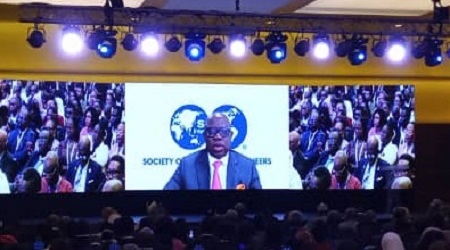Bayo Ojulari, GCEO of NNPCL, speaking to participants and industry leaders at the ongoing SPE conference in Lagos.
Group Chief Executive Officer (GCEO) of Nigerian National Petroleum Company (NNPCL), Bayo Ojulari, tasked stakeholders on strategic, and inclusive leadership to reconcile Nigeria’s energy demands with its environmental responsibilities and economic aspirations; even as the nation seeks to chart an equitable path in its energy journey.
In his first public appearance after the widespread rumours of his “voluntary resignation” has run rampant across the media, Ojulari, who pointedly uttered not a single statement or reference to those rumours, focused rather on the his speech which highlighted the pressing need to reconcile three imperatives—energy security, environmental sustainability, and economic development—if Nigeria and Africa are to chart a resilient path in the evolving global energy space.
“The future of energy is neither linear nor predetermined,” he noted. “It will be shaped by the decisions we make today, by how we intentionally engage, how we strategically invest, and how boldly we embrace innovation.”
The NNPCL helmsman challenged the long-held view of oil and gas as a “sunset industry,” reframing it as a cornerstone for building a sustainable and inclusive energy transition. He underscored the sector’s enduring role in powering economic growth, even as new energy technologies emerge.
At the heart of this repositioning is the need to deepen strategic engagement—both within Nigeria’s borders and globally—leveraging partnerships across sectors and regions to unlock new opportunities. The oil and gas sector, he emphasized, must not operate in isolation but be embedded in a broader ecosystem of collaboration, innovation, and environmental responsibility.
“The challenges before us—climate change, capital flight, technology gaps, and supply disruptions—are too complex to be addressed in silos,” Ojulari said. “We must foster robust, transparent, and constructive dialogue among all stakeholders—governments, financiers, civil society, and especially our youth.”
In a forward-looking section of his remarks, Ojulari highlighted the centrality of technological innovation to Nigeria’s energy transformation. From carbon capture, utilization and storage (CCUS) to hydrogen development, smart grid systems, and mobile gas distribution, he described a future where hydrocarbons and clean energy co-exist as complementary forces.
Nigeria’s ongoing deployment of Compressed Natural Gas (CNG) infrastructure, he said, is already proving to be a transformative step in democratizing access to cleaner energy.
Ojulari was of the view that intentional investments in emerging energy solutions, warning against dismissing them as “buzzwords” and instead embracing them as real, implementable tools for driving climate resilience without sacrificing industrial competitiveness.
Perhaps the most resonant aspect of Ojulari’s speech was his call for a contextual, just, and equitable energy transition. Acknowledging the low levels of energy access in many parts of Nigeria and Africa—particularly rural regions still reliant on biomass—he cautioned against energy transition narratives that ignore the continent’s developmental realities.
“Transition must not be imposed. It must be negotiated. It must be contextualized. And above all, it must be just,” he declared.
This, he explained, involves recognizing natural gas as a viable transition fuel, scaling clean cooking technologies, investing in green infrastructure, and channeling revenue from hydrocarbons into renewables, education, and public services.
The NNPCL GCEO spoke on the financing challenge head-on, stating that Africa must compete more effectively for global capital, especially in a world increasingly driven by ESG metrics, investor perception, and regulatory transparency.
To unlock investment at scale, he urged African nations to de-risk their environments through better governance, clear regulatory frameworks, and transparent fiscal systems. He highlighted instruments such as blended finance, climate-resilient funds, and long-term capital pools as key to attracting credible investors.
“Governments and industries must co-create an investment environment that is credible, attractive, and future-focused,” he said. “This is not just about profit, but about building resilient and uplifted communities.”
He advocated for the positioning of Nigeria’s youth as the custodians of tomorrow’s energy system. He made a plea for collective investment in STEM education, energy literacy, green skills, and entrepreneurship; insisting the energy sector is not just a career path but an avenue for invention, inclusion, and impact.
“The transition is not just about fuel—it’s about people,” he stressed. “And the people who will lead it are our youth.”
He made a call to action for all stakeholders in the energy sector, governments, industry leaders, financial institutions, civil society, and youth, to collaborate across borders and sectors. This, he says will build an oil and gas industry that is not only profitable, but purposeful; not only efficient, but enduring; not only relevant, but revolutionary.
Ojulari speech focused on Nigeria’s energy future that it will not be given. “It must be built—intentionally, inclusively, and on Nigeria’s terms.”


Comment here